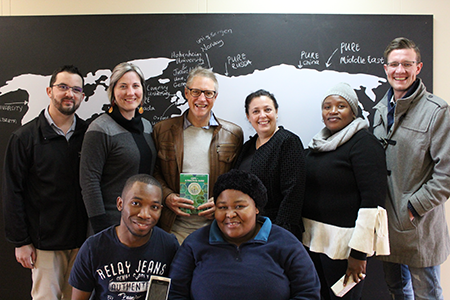The North-West University (NWU) in partnership with the University of Pretoria will be training community health workers (CHWs) and staff from the North West Provincial Department of Health on community-oriented primary care (COPC).
The NWU’s Africa Unit for Trans disciplinary Health Research (AUTHeR), under the leadership of Prof Petra Bester, is conducting the training.
The COPC programme uses mobile technology to enable CHWs to gather real-time health data from households and to manage the care of community members, concurrently with relevant health facilities.
The NWU’s Unit for Open Distance Learning’s facilities will make this all possible.
The aim of the programme is to promote health in homes and communities by focussing on the key individuals who provide these services. These include ward-based outreach teams, comprising outreach team leaders who are retired professional nurses, and CHWs.
These CHWs are from the communities in which they reside and are linked to all the primary health care clinics. One CHW is assigned to approximately 250 households.
Dr Bester says the COPC programme has been approved as the principal community engagement programme for the NWU’s Faculty of Health Sciences.
“So far this year all the CHWs and relevant departmental staff in the Dr Ruth Segomotsi Mompati and Bojanala districts have been trained and are receiving ongoing training and support.
The training for the other two districts, namely Ngaka Modiri Molema and Dr Kenneth Kaunda, will be completed this year,” she adds.
“An effective COPC programme will strengthen primary health care service delivery at community and district level and improve health outcomes.
“It will also provide a real-time database of the entire 3,4 million people in the province, which will offer an expanded research and teaching platform within communities.”
She says the COPC initiative can also offer every academic entity at the NWU access to this valuable resource.
“There is still much work to be done to ensure successful implementation of the COPC programme, but once the programme matures, it is envisioned that other academic disciplines will join in. This will ensure a broader integration of academic expertise vital for resilient good health for all,” adds Prof Bester.
More about COPC
South Africa is part of a global movement which gained momentum through the 1978 Alma Ata declaration to provide universal health coverage through a primary health care approach.
From this, COPC developed, with professionals from different disciplines and approaches working together with organisations and people in defined communities to identify and respond systematically to health and health-related needs in order to improve health.
“South Africa faces a burden of disease which is disproportionately higher than other middle-income countries. In response to this, the government has initiated a number of reforms within the health sector and is actively re-engineering primary health care towards the ultimate goal of establishing the National Health Insurance (NHI) system. This system will ensure universal coverage of equitable and quality health care to all South Africans,” explains Prof Bester.

Meet the NWU’s COPC-AitaHealth team: At the back from left are Dr Herman Myburgh, Karlien Smit, Prof Andrew Robinson, Prof Petra Bester, Mildred Thomas and Johan le Grange. In front are Kumbewe Liwewe and Lucia Matla.
